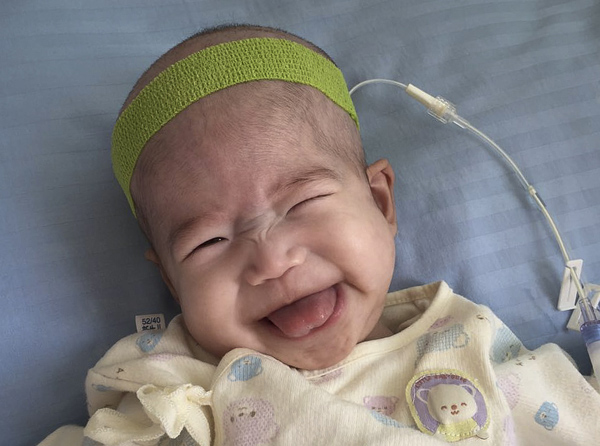Umbilical blood transfusion saves infant's life
An infant in Shanghai who received an umbilical cord blood transfusion when she was 6 months old to fight congenital genetic defects has become the youngest beneficiary of such a transfusion in the country.
The baby suffered serious diarrhea together with fever, vomiting and inflammation one week after she was born and was diagnosed with genetic defects. The only remedy for her was to transfuse umbilical cord blood stem cells to make up for the defects and control the disease.
Shanghai-based Children's Hospital of Fudan University in June found a blood match for her from the Shanghai Cord Blood Bank and made the transfusion on July 31. Doctors said the baby girl has conquered post-operation rejection and infection so far.
"Blood tests showed that 98.6 percent of the stem cells transfused have been working and the originally defective genes have turned normal. Her defecation frequency has become normal and she's gaining weight. It's a landmark victory at this phase," said Huang Ying, director of digestive department of the hospital.
The girl has been transferred to a general ward and the medical team will closely observe her diet and intestinal recovery.
The baby, Zhao Jiaxin, from Zhoukou, Henan province, was born on Jan 26.
Her parents finally took her to the Shanghai hospital for medical help after hospitals elsewhere failed to find the right remedy.
Doctors said Zhao was the youngest in the country to have been successfully cured of such disease by transfusion with the joint efforts of multiple departments.
The girl's father, Zhao Mingwei, said the family paid around 500,000 yuan ($78,800), most of which was borrowed from friends and donated by the public, for medical bills at the hospital. He was grateful that his daughter was saved.
"We had a girl the year before last. She showed similar symptoms after birth and died at 5 months old," he said.
Doctors said there are abundant hematopoietic stem cells in umbilical cord blood and they have been proven to be valuable in treating malignant blood diseases, immune deficiencies and tumors of the hematopoietic system.
"Compared to a bone-marrow transplant, it's easier to find a match for umbilical cord blood and the ratio of post-operation rejection is lower," said Zhai Xiaowen, director of hematology department of the hospital.
zhouwenting@chinadaily.com.cn
|
 Eightmonthold Zhao Jiaxin receives checks on Friday at Children's Hospital of Fudan University after receiving an umbilical cord blood transfusion. Zhao Mingwei / For China Daily |


















